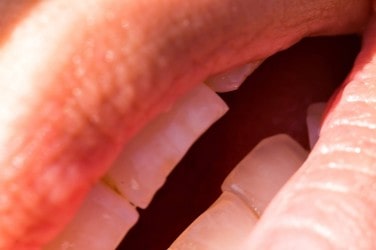science
Why Do I Have a Salty Taste in Your Mouth: Is it a Vitamin Deficiency?
On This Page

A salty taste in your mouth is usually an easy fix. But sometimes the underlying cause requires medical or dental care. Know what your symptoms mean.
Should I be concerned when I have a salty taste in my mouth?
It’s not uncommon for someone to wake up with a salty taste in their mouth and in most cases it isn’t a medical emergency. But it is something you should pay attention to. A salty meal the night before, excessive mouth breathing, medication side effects, and dehydration are among the more routine causes and are fairly benign. There are times, however, when it could be a sign of an underlying health condition, so it’s important to be informed.
Vitamin deficiencies that can cause a salty taste
Vitamin C deficiency
Dietary nutrient intake can affect taste recognition and possibly overall health. Vitamin C has been suggested to influence the adrenal cortex, and adrenal issues can be one of the factors that elevates salty taste. In one study of elderly patients, salty and sour tastes were associated with levels of iron, thiamin, fiber, vitamin C, and riboflavin. The good news is that it’s easy to increase your vitamin C level through diet and proper supplementation.
Folate deficiency
Folate deficiency can often present as mouth sores and swollen tongue. If not treated early, it could lead to more serious health conditions. But it is treatable with a diet rich in leafy greens, beans, avocados, and fortified cereals and grains, or, when necessary, a folate supplement.
Vitamin B12 deficiency
Vitamin B12 deficiency can disrupt the taste buds, so a salty taste could be attributed to that. It is a deficiency that can come on both slowly and quickly, and if left unattended, could lead to other health problems. It is important to remember that plants do not make B12, so a diet rich in meat, eggs, poultry, dairy products, and fortified grains is necessary to increase your intake with food. Supplementation is also recommended.
Zinc deficiency
Zinc is a trace element that is critical for many enzyme-related activities in the body. A study confirmed that salty taste perception and preference may be impacted by one’s zinc nutritional status. Zinc supplements are widely available.
Other possible causes
Oral bleeding
A salty or metallic taste in your mouth might be caused by bleeding as a result of aggressive brushing and flossing, accidentally biting your tongue, or eating foods that have sharp edges. If bleeding persists, consult your dentist for proper treatment.
Oral issues
If left untreated, oral issues can become more serious fairly quickly. You might experience bad breath, loose teeth, and gum issues. You may also be susceptible to white patches with a burning sensation in your mouth. Most of these conditions present with a salty taste in the mouth, though some have no taste at all. It is imperative that you see your dentist at the onset of any of these symptoms. With early treatment, there may not be any lasting effects.
Post nasal drip
Seasonal sinus issues can often cause a dripping down the back of your throat known as postnasal drip. It can leave you constantly coughing and clearing your throat, as well as impacting your sense of taste. Mucus and phlegm can have a salty taste. If your symptoms persist, see your doctor.
Dry mouth
Dry mouth occurs when your salivary glands fail to make enough saliva. It is often accompanied by salty and metallic taste sensations, bad breath, and a sore throat. Dry mouth can be caused by dehydration, stress, mouth breathing, smoking, or as a side effect to certain medications. If you don’t find relief from lubricating lozenges and oral rinses, you should consult your physician for further consideration.
Occasional indigestion
Occasional indigestion occurs when your stomach acid leaks back into your esophagus. It can cause a salty taste in your mouth, but may also be accompanied by other symptoms. This study demonstrated the differences in both the taste and smell of those who experience indigestion from time to time. Symptoms can be alleviated with medication that decreases or neutralizes stomach acid. If, however, symptoms increase or persist, consult with your physician, as indigestion can cause health problems if left untreated.
Can blood pressure issues cause salty taste in mouth?
There is evidence to suggest that changes in salty taste sensitivity can predict the onset of blood pressure issues, especially with age. Periodic checking of your blood pressure is a good thing on its own, but it can also be easily ruled out as the cause of salty taste in your mouth.
Possible ways to get rid of salty taste in your mouth
The correct treatment for salty taste in your mouth will depend upon the cause. You might try increasing your water intake, practicing better dental hygiene, rinsing with a mouthwash, and reducing alcohol and tobacco use. If you are taking a new medication, check with your physician or pharmacist to see if this salty taste is a possible side effect.
When to talk to your doctor
If the taste does not go away fairly quickly, or if you suspect you have another underlying issue, call your doctor or dentist right away. Early detection of these underlying conditions is important.
Key takeaways
Plenty of people experience a salty taste in their mouth from time to time. Typically, it is not something to worry about. It could be from the food you’ve eaten, seasonal sinus issues, excessive mouth breathing, or even a lapse in your dental hygiene routine. But if the symptoms don’t go away in short order, it is important to see your doctor or dentist. Lifestyle changes, medication, and supplementation can often resolve the condition once the cause is determined. And, as always, a good multivitamin like Care/of’s never hurts, only helps.



